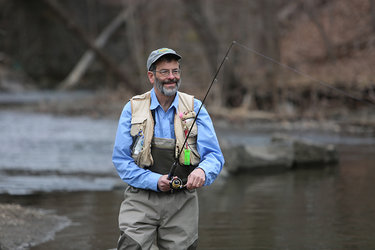After a lifetime of fishing, Rowen still finds surprises
GUILDERLAND — “You go fishing and there’s an infinite possibility for surprise,” says Guilderland angler John Rowen.
He’s fished trout streams in Rensselaer County that are no wider than a driveway and found 17-inch trout in them, “which is crazy,” he says with glee.
Rowen was fishing once after a tropical storm blew through the area and caught a beautiful rainbow trout. Another time, he was fishing when, he recalled, “All of a sudden, the stream bottom started to move and I looked closer … There was a snapping turtle about 15 feet upstream from where I was that was about the size of a manhole cover.”
Rowen finds the many encounters he has with fish and with nature very appealing.
In this week’s Enterprise podcast, recorded on April 1, the traditional opening day for trout season, Rowen provides a primer for would-be anglers.
He goes over the three types of rods — with a spin reel, a push-button reel, or a fly rod. He notes that push-button rods can be checked out at local libraries, including Guilderland’s, so that people can try fishing, cost-free, to see if they like it.
Rowen also goes over the different kinds of bait and tied flies.
“Everybody has a special one they believe in,” he says.
Rowen himself likes to use small red worms for bait, which he notes can be plucked from a backyard compost pile.
“You can’t leave them in the car,” he warns, adding, from experience, “If you put them in the refrigerator, make sure there’s a tight lid on because you want to stay friends with your family.”
Rowen started fishing as a boy of 5 or 6. He was smitten by a department store display in Bloomington, Indiana where he lived. So his father bought him some tackle and took him fishing.
When his family moved to Staten Island, Rowen, as a teenager, fished on the jetties on Long Island with saltwater fishing tackle.
Then, when he moved to the Albany area in the late 1970s, he developed a passion for trout fishing.
“I like stream fishing because I’m under the illusion that it is more aerobic than sitting in a boat because you have to walk the stream,” he said, conceding, “But lately I’ve realized that I will stand for half an hour in one place, trying a different fly, trying a different drift. So maybe that’s self-delusion.”
As he is fishing, Rowen is constantly thinking, as he looks around, “Where might there be a fish?”
“Even though fish have very small brains, they are supremely evolved to fit their environment and they are very sensitive to motion, to noise … You want to blend into the environment,” said Rowen.
He appreciates living in a place with so many nearby fishing possibilities.
Rowen has friends who live in the Los Angeles area and have to drive for hours to the Eastern Sierras to fish for trout. “We can drive to some of the best trout streams in the world in a day trip,” says Rowen, naming the trout streams and reservoirs in Albany and Rensselaer counties as well as the Mohawk and Hudson rivers.
“The Hudson River in front of Albany is tidal, and in May there is a run of shad and striped bass ….,” said Rowen. “You don’t have to drive to Cape Cod or the Hamptons to fish for striped bass for this little window of time.”
Rowen is an avid reader as well as an avid angler.
“If you like to read about fishing, the nonfiction is in the 799.1s,” he said, advising library-goers.
He described several of his favorite books on fishing. One is “The Angler’s Coast” by the late Russell Chatham, who wrote for Sports Illustrated. In his 1976 book, Chatham documented fishing the Pacific from San Francisco to Vancouver.
Rowen described a story in the book where Chatham and a friend were fishing for striped bass one night in a favorite spot when a policeman pulled up.
“What are you doing?” the policeman asked. This was in an era “when smoking marijuana was still a significant legal issue,” said Rowen.
“Russ and his friend were so keen to not let this cop know about how good the striped bass fishing was, they said, ‘Well, we’re just having a little toke here, officer,’” Rowen recounted, adding, “They didn’t get busted.”
Rowen reflected on anglers’ unwillingness to share their favorite fishing spots: “It might be either competitive or atavistic,” he said. “It’s like, ‘This is mine.’”
